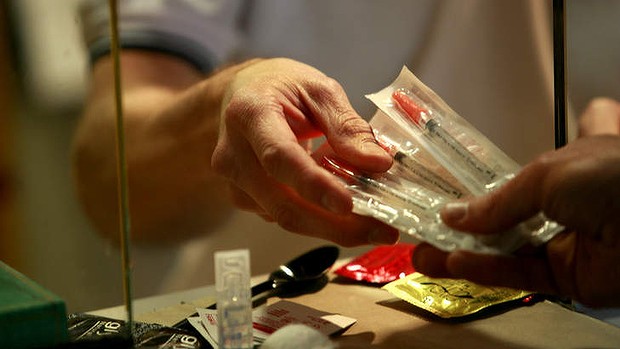
Gov. Mike Pence on Thursday declared a public health emergency in southeastern Indiana where an HIV outbreak is underway and announced the state would sanction a short-term needle-exchange program.
Pence, who declared the situation an “epidemic,” said the needle-exchange program would last for 30 days and then would be re-evaluated. Its “sole purpose,” he said, would be to stop the spread of HIV, the virus that causes AIDS.
Pence said he personally opposes needle-exchange programs but signed an emergency order allowing one to be used in Scott County in southern Indiana, about 30 miles north of Louisville, Kentucky.
Scott County has had 79 HIV cases since December, all tied to injected drugs. It will now be allowed to set up a needle-exchange program with the state health department limited to suppressing the outbreak under the order.
“The people of Scott County are working hard to address this crisis, and with additional state resources and new tools provided by this emergency declaration, I am confident that together we will stop this HIV outbreak in its tracks,” Pence said in a statement on Thursday.
Pence also ordered the state health department to set up a command center to coordinate HIV and substance abuse treatment and establish a mobile unit to enroll people in a state-run health program.
The Indiana governor said the U.S. Centers for Disease Control and Prevention recommended the program and he was willing to support one if county officials want it. “This is all hands on deck. This is a very serious situation,” he said.
Such programs provide intravenous drug users with sterile needles in an effort to prevent infections from the sharing of contaminated needles. Needle exchange programs are endorsed by many major medical organizations, including the Infectious Diseases Society of America (IDSA) and the HIV Medicine Association (HIVMA).
The Indiana outbreak is unique because officials say all cases have been tied to intravenous drug use. Initial cases were diagnosed after people injected themselves with the powerful painkiller Opana, which contains oxymorphone, officials said.
People also have become infected after injecting other drugs including methamphetamine and heroin, officials said.
Scott County officials say they have been fighting narcotics, and in particular prescription drug use, for several years, and the HIV outbreak has raised the level of concern.
Since December, the county has had 72 confirmed HIV cases and seven preliminary ones, but officials fear up to 100 cases could be identified. The county in past years has reported fewer than five new HIV cases annually, according to state statistics.
In total, 146 new HIV cases have been confirmed statewide in Indiana since January. The recent surge in infections is the state’s largest-ever HIV outbreak.
While Pence emphasized the temporary nature of the order, experts say 30 days is not nearly long enough to address the crisis. Dr. Don Des Jarlais, director of research for the chemical dependency institute at Mount Sinai Beth Israel in New York, called on Pence to make the needle-exchange program permanent.
“The potential for continued transmission,” he said, “will be there for a decade or more” in southern Indiana.
Nationwide, more than 1.2 million people are living with HIV infection, and about 50,000 new cases of the virus are confirmed annually in the United States. Injection drug users are estimated to make up 8% of all new HIV cases and 11% of those currently living with HIV.
